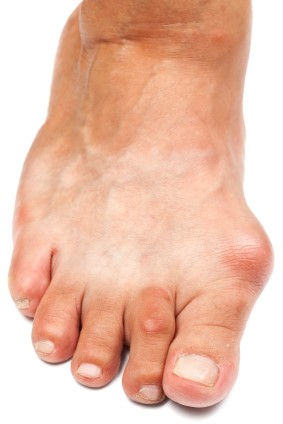Women More Likely to Develop Bunions
Monday, 28 March 2016 16:43 Many women are susceptible to the deformity of the metatarsophalangeal joint, known as a bunion. If not hereditary, many women experience this condition after repeatedly stuffing their feet into shoes with narrow toe boxes. When the first toe begins to turn inward because of the deformity of the join, the other toes will suffer as well. Those in professions where you are often on your feet, such as teachers, nurses, or ballerinas, can experience the onset of bunions more often than those who are not on their feet as much.
Many women are susceptible to the deformity of the metatarsophalangeal joint, known as a bunion. If not hereditary, many women experience this condition after repeatedly stuffing their feet into shoes with narrow toe boxes. When the first toe begins to turn inward because of the deformity of the join, the other toes will suffer as well. Those in professions where you are often on your feet, such as teachers, nurses, or ballerinas, can experience the onset of bunions more often than those who are not on their feet as much.
Bunion surgery usually occurs after non-surgical methods have proved to be ineffective. If you have any concerns, see Dr. Steven Schwartz from Pennsylvania. Our doctor will treat your feet in addition to other podiatric-related needs.
What is a Bunion?
A bunion is formed of swollen tissue or an enlargement of boney growth, usually located at the base joint of the toe that connects to the foot. The swelling occurs by the bones in the big toe shifting inward, which impacts the other toes of the foot. This causes the area around the base of the big toe to become inflamed and painful.
Why do Bunions Form?
- Genetics – susceptibility to bunions are often hereditary
- Stress on the feet – poorly fitted and uncomfortable footwear that places stress on feet, such as heels, can cause bunions to form
How are Bunions Diagnosed?
Doctors often perform two tests – blood tests and x-rays – when trying to diagnose bunions, especially in the early stages of development. Blood tests help determine if the foot pain is being caused by something else, such as arthritis, while x-rays provide a clear picture of your bone structure to your doctor.
How are Bunions Treated?
- Refrain from wearing heels or similar shoes that cause discomfort
- Select wider shoes that can provide more comfort and reduce pain
- Anti-inflammatory and pain management drugs
- Orthotics or foot inserts
- Surgery
If you have any questions, please feel free to contact our offices located in Chambersburg and Mcconnellsburg, PA. We offer the newest diagnostic and treatment technologies for all your foot care needs.

